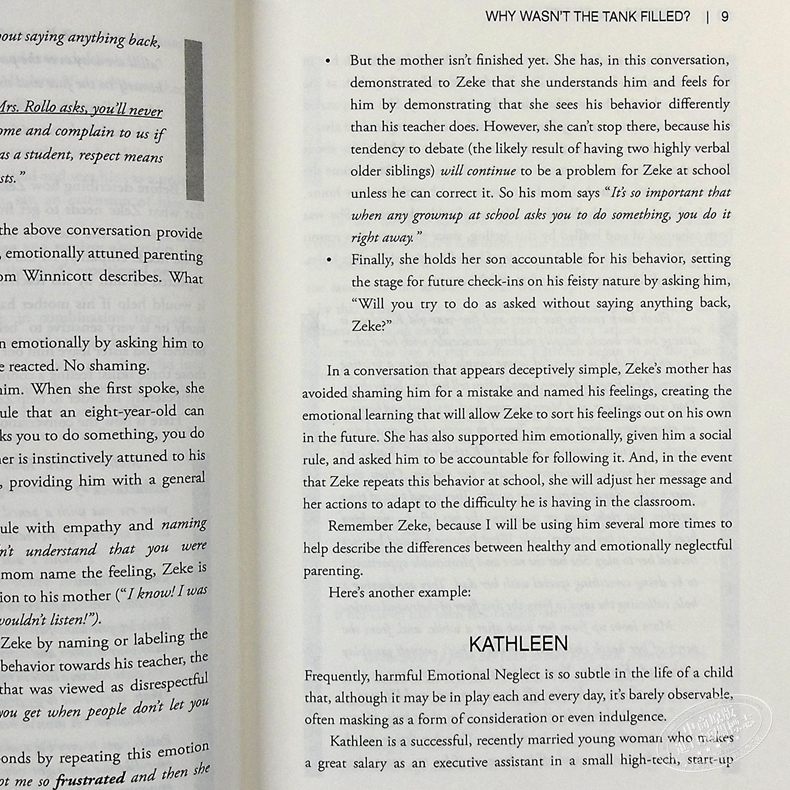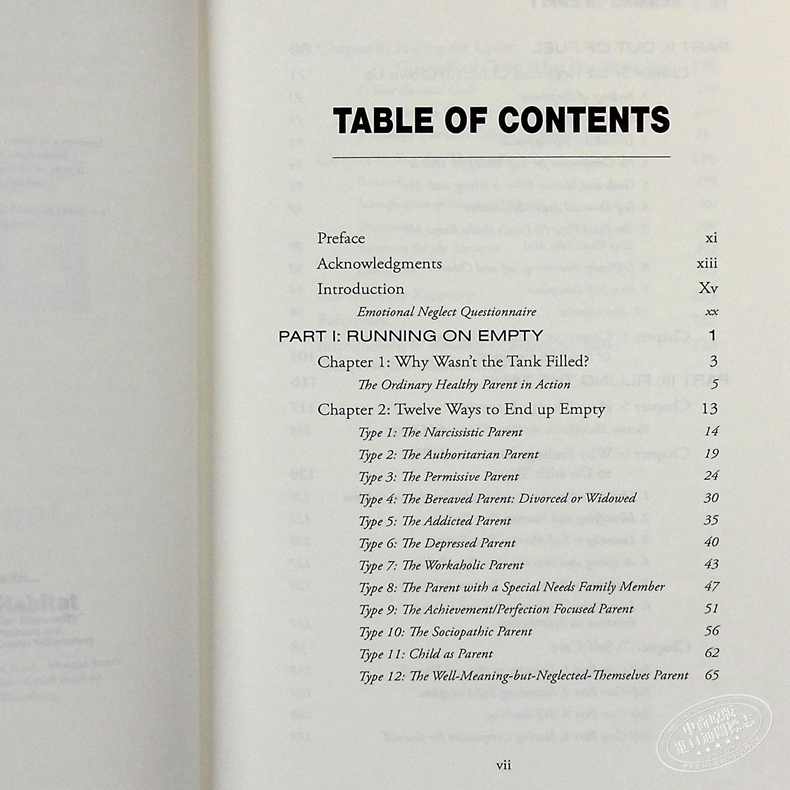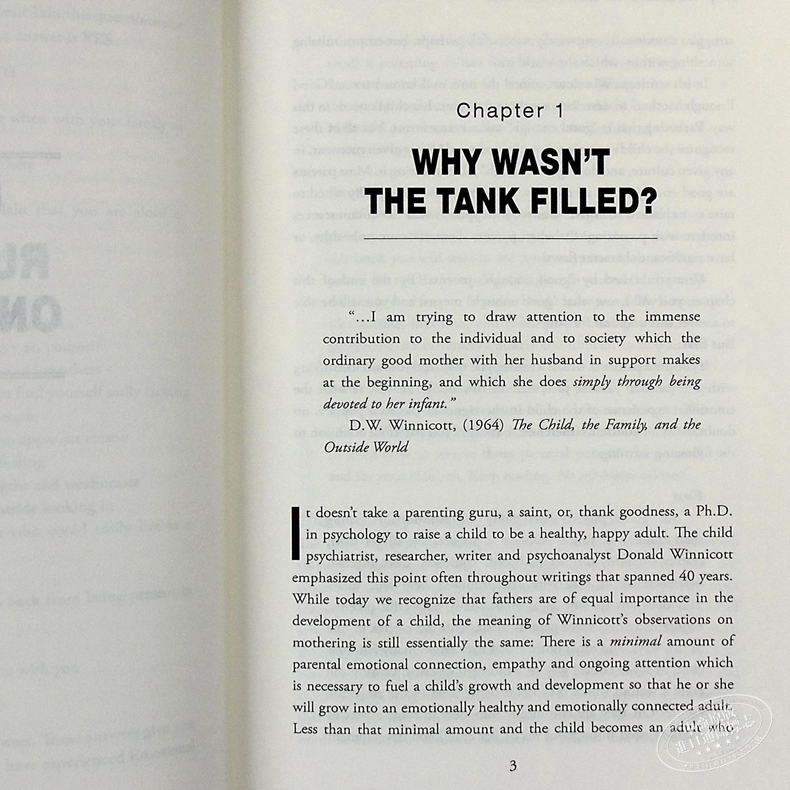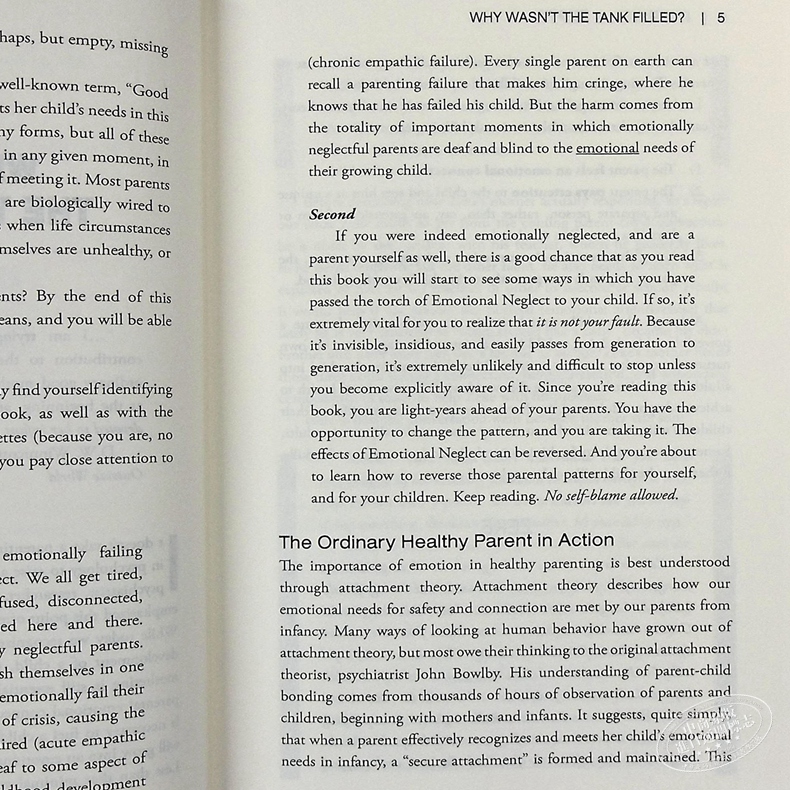Running on Empty: Overcome Your Childhood Emotional Neglect
被忽視的孩子:如何克服童年的情感忽視
基本信息
Author:Jonice Webb
Format:Paperback | 250 pages
Dimensions:152 x 229 x 14mm | 181g
Publication date:01 Oct 2012
Publisher:Riverhead Books
Language:English
ISBN10:161448242X
ISBN13:9781614482420
頁面參數僅供參考,具體以實物為準
書籍簡介
《被忽視的孩子》是第一本關於情感忽視的自助書籍:一種來自你童年的無形的力量,你看不見,但可能影響你直到今天。它是關於你童年沒有發生的事情,沒有説過的事情,以及不能記住的事情。
如果是這樣,你並不孤單。這個世界上有很多人都有一種天生的感覺,覺得自己有問題。他們覺得自己活在外面,看着裏面,但無法解釋自己的感受,也無法用語言表達出來。責備自己沒有變得更快樂。
如果你是這些人中的一員,你可能會擔心你和你的配偶的聯繫不夠緊密,或者你不會像其他人那樣深切地感受到快樂和愛。也許當你經歷強烈的情感時,你很難理解或容忍它們。你可能會喝得太多,吃得太多,或者冒太多的風險,試圖去感受一些好的東西。
在從業20多年的心理學生涯中,很多人來到喬妮絲·韋伯的辦公室,他們受到離婚的威脅、抑鬱症的發作或孤獨的驅使,説:“我缺了什麼。”
《被忽視的孩子》將給你一個明確的策略如何治癒,併為心理健康專業人士提供了一個特別的章節。在人類苦難的世界裏,這本書是一枚情感上的智能炸彈,旨在根除隱形敵人的影響。
Running on Empty is the first self-help book about Emotional Neglect: an invisible force from your childhood which you can't see, but may be affecting you profoundly to this day. It is about what didn't happen in your childhood, what wasn't said, and what cannot be remembered.
Do you sometimes feel as if you're just going through the motions in life? Are you good at looking and acting as if you're fine, but secretly feel lonely and disconnected? Perhaps you have a fine life and are good at your work, but somehow it's just not enough to make you happy.
If so, you are not alone. The world is full of people who have an innate sense that something is wrong with them. Who feel they live on the outside looking in, but have no explanation for their feeling and no way to put it into words. Who blame themselves for not being happier.
If you are one of these people, you may fear that you are not connected enough to your spouse, or that you don't feel pleasure or love as profoundly as others do. Perhaps when you do experience strong emotions, you have difficulty understanding or tolerating them. You may drink too much, or eat too much, or risk too much, in an attempt to feel something good.
In over twenty years of practicing psychology, many people have arrived in Jonice Webb's office, driven by the threat of divorce or the onset of depression, or by loneliness, and said, "Something is missing in me."
Running on Empty will give you clear strategies for how to heal, and offers a special chapter for mental health professionals. In the world of human suffering, this book is an Emotional Smart Bomb meant to eradicate the effects of an invisible enemy.
作者簡介
Jonice Webb擁有臨牀心理學博士學位,並於1991年獲得執業*。她在研究、心理測試和心理治療方面有很強的背景。韋伯在她的職業生涯中擔任過三家大型門診診所的主任。她目前在馬州列剋星敦有一傢俬人心理治療診所,專門為夫妻和青少年提供治療。
Jonice Webb has a PhD in clinical psychology, and has been licensed to practice since 1991. She has a strong background in research, psychological testing and psychotherapy. Webb has been the Director of three large outpatient clinics over the course of her career. She currently has a private psychotherapy practice in Lexington, MA, where she specializes in the treatment of couples and adolescents.
目錄
Preface
Acknowledgements
Introduction
Emotional Neglect Questionnaire
Part I: Running on Empty
Chapter 1: Why Wasn’t the Tank Filled?
The Ordinary Healthy Parent in Action
Chapter 2: Twelve Ways to End Up Empty
Type 1: The Narcissistic Parent
Type 2: The Authoritarian Parent
Type 3: The Permissive Parent
Type 4: The Bereaved Parent: Divorced or Widowed
Type 5: The Addicted Parent
Type 6: The Depressed Parent
Type 7: The Workaholic Parent
Type 8: The Parent with a Special Needs Family Member
Type 9: The Achievement/Perfection Focused Parent
Type 10:The Sociopathic Parent
Type 11:Child as Parent
Type 12:The Well-Meaning-but-Neglected-Themselves Parent
Part II: Out of Fuel
Chapter 3: The Neglected Child, All Grown Up
1. Feelings of Emptiness
2. Counter-Dependence
3. Unrealistic Self-Appraisal
4. No Compassion for Self, Plenty for Others
5. Guilt and Shame: What is Wrong With Me?
6. Self-Directed Anger, Self-Blame
7. The Fatal Flaw (If People Really Know Me They Won’t Like Me)
8. Difficulty Nurturing Self and Others
9. Poor Self-Discipline
10. Alexithymia
Chapter 4: Cognitive Secrets: The Special Problem of Suicidal Feelings
Part III: Filling the Tank
Chapter 5: How Change Happens
Factors That Get in the Way of Successful Change
Chapter 6: Why Feelings Matter and What to Do with Them
1. Understanding the Purpose and Value of Your Emotions
2. Identifying and Naming Your Feelings
3. Learning to Self-Monitor Your Feelings
4. Accepting and Trusting Your Own Feelings
5. Learning to Express Your Feelings Effectively
6. Recognizing, Understanding and Valuing Emotions in Relationships
Chapter 7: Self-Care
Self-Care Part 1. Learning to Nurture Yourself
Self-Care Part 2. Improving Self-Discipline
Self-Care Part 3. Self-Soothing
Self-Care Part 4. Having Compassion for Yourself
Chapter 8: Ending the Cycle: Giving Your Child What You Never Got
1. Your Parental Guilt
2. The Changes You Have Made So Far
3. Identify Your Own Specific Parenting Challenges
Chapter 9: For the Therapist
Research
Identification of Emotional Neglect
Treatment
Summary for the Therapist
Conclusion
Resources for Recovery
References



評論曬單